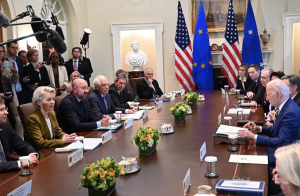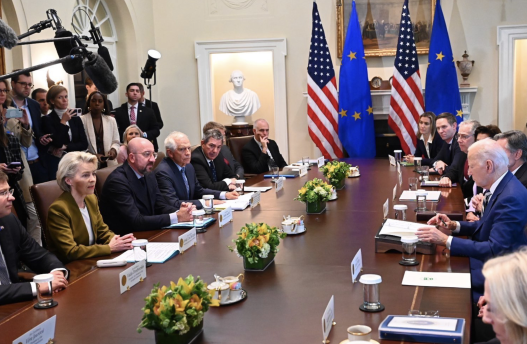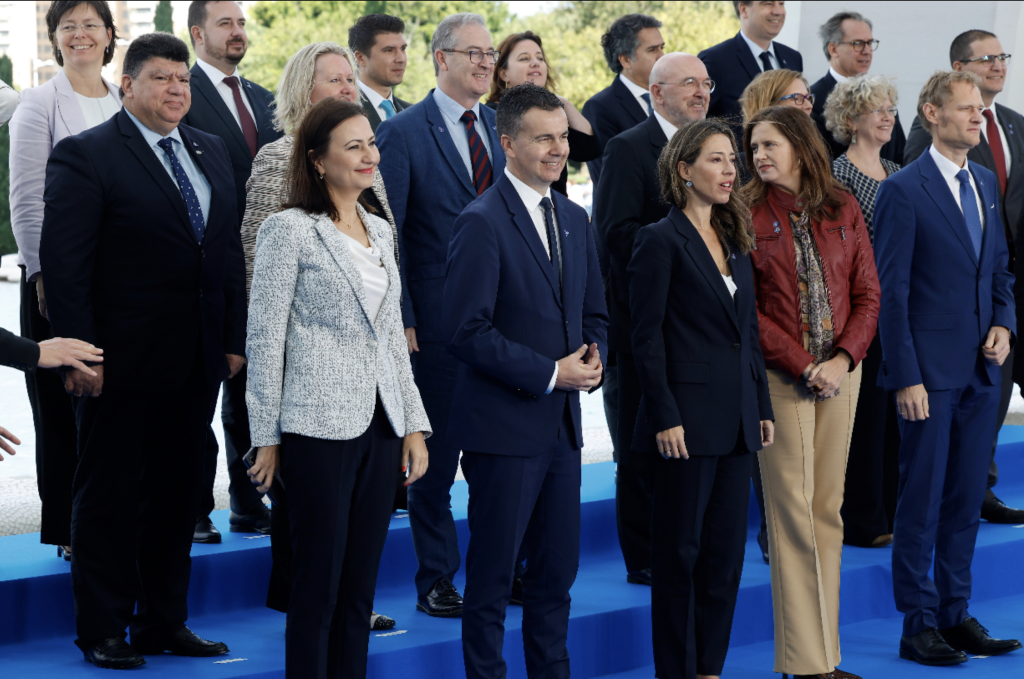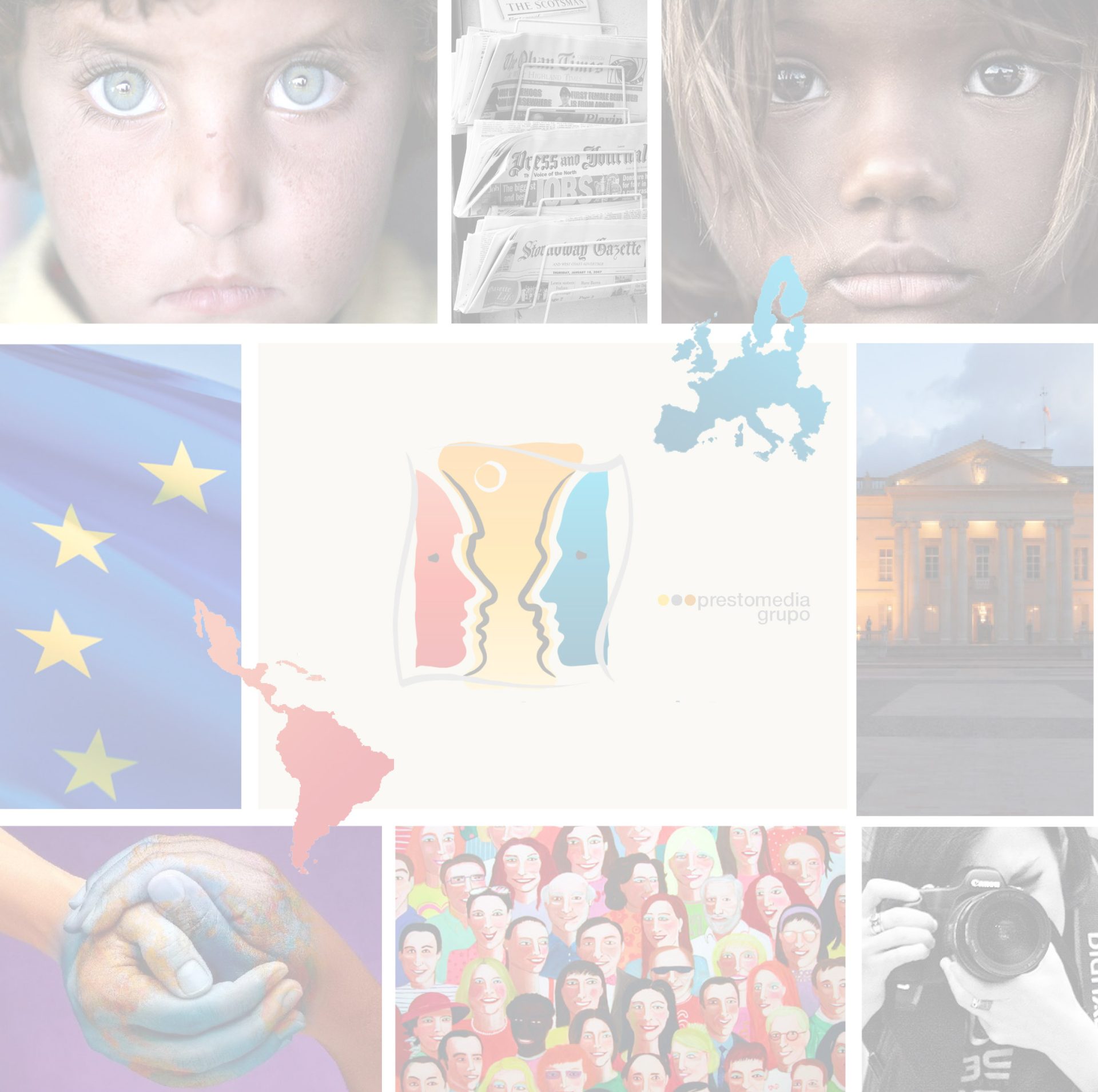
US-EU SUMMIT: TOTAL HARMONY IN CONDEMNING HAMAS AND RUSSIA
By Jesús González Mateos*
The summit between the United States and the European Union held in Washington has concluded with a joint declaration of 34 points with two main thematic axes, the first of them under the expression “towards a safer and more stable world” and the second dedicated to the “strengthening of US-EU economic cooperation.”
“WE ARE MORE UNITED THAN EVER”
Regarding the international situation and the state of relations between the two, the statement states that “since the last Summit between the United States and the EU in June 2021, the world has changed in unprecedented ways and we have taken ambitious measures in response. Together, we are working to ensure peace, stability and prosperity at the regional level and around the world, including our strong support for Ukraine. We are deepening our cooperation to reflect the pressing challenges and opportunities of our time: strengthening our economic security; promoting reliable, sustainable, affordable and safe energy transitions in our economies and globally; strengthening multilateralism and international cooperation; and taking advantage of digital technologies to work for, not against, our shared values of democracy and respect for human rights and the rule of law. We are more united than ever,” he concludes.
SITUATION IN THE MIDDLE EAST
The statement strongly condemns Hamas’ attacks on Israel. “There is no justification for terrorism. We affirm Israel’s right to defend itself against these heinous attacks, in accordance with international law, including international humanitarian law. We will work closely with partners in the region to emphasize the importance of protecting civilians, supporting those who try to get to safety or provide assistance and facilitating access to food, water, medical care and shelter. We are concerned about the deterioration of the humanitarian crisis in Gaza. It is crucial to avoid a regional escalation. We call for the immediate release of all hostages and emphasize our shared opinion that a two-state solution remains the viable path to a lasting peace,” he says.
UKRAINE’S WAR AGAINST RUSSIA
Regarding the war in Ukraine, the statement does not leave any doubt about the position of both. “The United States and the European Union remain unwavering in our long-term political, financial, humanitarian and military support to Ukraine and its people while defending themselves against Russia’s war of illegal and unprovoked aggression. We unite to call on Russia to end its brutal war and withdraw its military forces, its representatives and its military equipment immediately, completely and unconditionally from the entire internationally recognized territory of Ukraine. We are committed to achieving the broadest possible international support for the key principles and objectives of the Ukraine Peace Formula. Any initiative for a comprehensive, just and lasting peace in Ukraine must be based on full respect for the independence, sovereignty and territorial integrity of Ukraine, within its internationally recognized borders and defend all the purposes and principles of the Charter of the United Nations,” he states.
CHINA AND NATO
The statement also has a large section dedicated to China. Despite recognizing the need to normalize relations with Beijing, they point out actions to reduce dependence on Chinese products. “With a view to enabling sustainable economic relations with China, we will promote a level playing field for our companies and workers. We are not uncoupling or turning inward. At the same time, we recognize that economic resilience requires reducing risks and diversifying. In this context, we will invest in our own economic vitality and reduce critical dependencies and vulnerabilities, even in our supply chains. We also recognize the need to protect certain advanced technologies that could be used to threaten global peace and security, without unduly limiting trade and investment. We will promote resilience in the face of economic coercion. We will address the challenges posed by policies and practices outside the market,” he makes clear.
Both enshrine NATO as the organization in which they trust their security and defense. “We will continue to strengthen and deepen EU-US cooperation and commitment in the field of security and defense. This could include improving practical cooperation in theaters of operations of mutual interest. NATO continues to be the basis of the collective defense of its allies and essential for Euro-Atlantic security. We recognize the value of a stronger and more capable European defense that contributes positively to global and transatlantic security and is complementary and interoperable with NATO. We welcome the signing of the Administrative Agreement between the United States Department of Defense and the European Defense Agency,” he states in this regard.
CLIMATE COMMITMENT AND VISA-FREE TRAVEL
In the section of strengthening economic cooperation, they are committed to building “sustainable and resilient economies in the future.” To do this, they agree on the need to meet the objectives of decarbonization to achieve climate neutrality. In addition, they point out the need to intensify scientific cooperation and technological exchanges on both sides of the Atlantic. The need to promote rule-based trade and fight against unfair trade is also pointed out.
Finally, the United States and the European Union intend to expand contacts between people from both regions. To do this, visa-free travel is targeted. “To preserve the strength and longevity of our transatlantic relationship, the United States and the European Union also strive to increase vital exchanges between peoples. We will work to achieve visa-free travel between all EU member states and the United States. Together, the United States and the European Union intend to provide additional resources to increase the number of transatlantic academic exchanges. The European Union will increase its funding for the Erasmus+ program and double the EU’s support for the Fulbright-Schuman program and all Fulbright Commissions in the EU Member States. The United States plans to increase its funding to all Fulbright Commissions in the EU member states, including the Fulbright-Schuman program. This collective support will significantly increase the number of transatlantic academic exchanges among our citizens over the next five years,” the statement concludes.
* Jesús González Mateos, a Spanish journalist, is the president of EditoRed.
This text was originally published in Here Europe. If you plan to use it, please cite that source.



